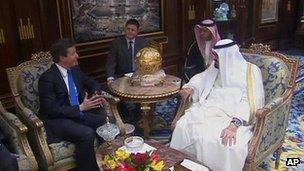David Cameron in talks with Saudi king
- Published

David Cameron and King Abdullah were expected to discuss energy security and the global economy
David Cameron has visited Saudi Arabia, for the first time as prime minister.
He met King Abdullah and Crown Prince Nayef in Riyadh for talks which No 10 hopes will "broaden and deepen" the UK-Saudi relationship.
Downing Street said they agreed to strengthen co-operation in some areas and discussed shared concerns about Syria, Iran, Yemen and Somalia.
One of the main aims of the trip was to establish a personal relationship between the PM and the Saudi king.
Saudi Arabia is the UK's largest trading partner in the Middle East with annual trade worth £15bn a year. It has £62bn invested in the UK economy.
'Unique influence'
The UK government sees strong relations with the Saudis as vital to advancing Britain's interests in the region.
Mr Cameron is travelling without UK reporters - which is unusual on a foreign trip - but Foreign Secretary William Hague insisted the visit was "not furtive".
"It's a well advertised meeting," he told BBC Radio 4's World at One.
Daniel Kawczynski MP: UK media "denigrates Saudi Arabia systematically"
"Saudi Arabia is our largest trading partner in the Middle East... but it also has unique influence in the region and in the Islamic world.
"It has been influential in the work of the Arab League recently in putting pressure on the repressive regime of [Syrian] President Assad.
"People who think we shouldn't be friends with - or our prime minister shouldn't be visiting - a country that is such an important ally and such an important force in the world would be advocating a head-in-the-sand policy, and that is not in our national interest."
In an interview with the Al Arabiya news network on Friday, Mr Cameron said the UK was prepared to table a new resolution at the UN Security Council over the "appalling bloodshed" carried out by the Syrian regime.
"This is appalling bloodshed, appalling murder on the streets of Syria," Mr Cameron said.
"The whole Arab League has come together and said it's unacceptable and others need to listen to that and act on that at the UN. Britain stands ready to do that."
Arms sales
BBC security correspondent Frank Gardner says the Saudi Arabia visit is important for both Mr Cameron and his hosts - King Abdullah and interior minister Crown Prince Nayef, the heir to the throne.
He says Saudi Arabia has been rattled by both the overthrow of its longstanding ally, President Mubarak of Egypt, and the recent tensions with Iran.
Both the UK and Saudi Arabia are hoping to forge a new strategic partnership in energy, business and security.
A Saudi official told the BBC the leaders would discuss sales of the latest technology and weaponry, and making Britain a major part of a massive Saudi military expansion.
On Thursday, MPs on the committee on arms export controls, external published questions it had submitted to the government about British arms sales to Saudi Arabia.
The committee asked why, when there was unrest in the country in 2011, licences for a range of equipment had not been revoked.
"Why does the UK believe that the assurances relating to end-use will not be breached?" the committee asked.
Speaking to the BBC, Labour MP Katy Clark, a member of the committee, said Saudi Arabia had an "appalling human rights record" which the prime minister could not ignore.
"I think we need to ask some serious questions of David Cameron about what he is doing in our name in Saudi Arabia," she said.
"Is he raising issues about individual abuses of human rights or is he promoting the sale of arms? And if it's arms, what kind of arms and what are they going to be used for?"
- Published13 January 2012